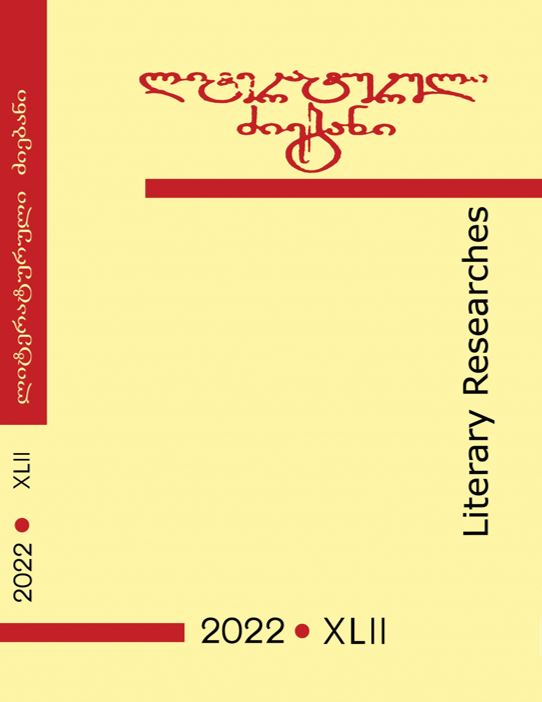At the Beginning of New Georgian Literature: (According to Sulkhan-Saba Orbeliani’s “Journey to Europe”)
Published 2022-04-30
Keywords
- Sulkhan-Saba Orbeliani,
- Novel,
- Enlightment,
- Fiction,
- Genre
How to Cite
Abstract
Sulkhan-Saba Orbeliani’s “Journey to Europe” is one of the first nonfiction novels of Georgian literature. The issue of text genre is not a controversial issue. According to Georgian scientists, Sulkhan-Saba Orbeliani’s “Journey to Europe” is a perfect example of the documentary, as well as it is an example of memoirs.
The non-fiction novel is a literary genre which, to be more precise, depicts real historical figures and actual events woven together with fictitious conversations and uses the storytelling techniques of fiction. The non-fiction novel is an otherwise loosely defined and flexible genre.
Georgian literature has its own way of development and to this testifies its genetic relation with European literature what is challenging for typological research.
From a narratological point of view and influence of contemporary critical discourse on the development of scientific theories it is quite possible to talk about a new reading of Sulkhan-Saba Orbeliani’s “Journey to Europe” (M. Kharbedia).
Numerous researchers of Georgian literature have noted that Sulkhan-Saba Orbeliani’s “Journey to Europe” belongs to the documentary as well as it belongs to other genres. These researchers are: A. Baramidze, A. Gatserelia, M. Kharbedia, L. Menabde and others. In this scientific article I tried to introduce their positions and to prove that Sulkhan-Saba Orbeliani’s “Journey
to Europe” belongs to the documentary as well as it belongs to the fiction too.
Sulkhan-Saba Orbeliani’s “Journey to Europe” includes many examples of appeal. The author addresses contemporaries and readers. According to this Sulkhan-Saba Orbeliani’s “Journey to Europe” can be called an epistolary novel.
Epistolary novels can be categorized based on the number of people whose letters are included. This gives three types of epistolary novels: monologic – giving the letters of only one character. As it is known, many researchers, for example, Giorgi Leonidze, think that addressee of Sulkhan-Saba Orbeliani’s
papers/memoirs was Vakhtang the VI; Dialogic – giving the letters of two characters and polylogic – with three or more letter-writing characters.
As I mentioned, Sulkhan-Saba Orbeliani’s “Journey to Europe” includes many examples of appeals. Sulkhan-Saba Orbeliani did not have only one addressee, for example, Vakhtang the VI, but many recipients. They were his contemporary readers and they are future generations of readers. This is one of the reasons why Sulkhan-Saba Orbeliani’s “Journey to Europe” can be called an epistolary novel.
It should be specially noted, that according to the conception of numerous researchers of Georgian literature, Sulkhan-Saba Orbeliani wrote “The Wisdom of Lie” after his journey to Europe. The origin of Georgian fiction novel is connected with Sulkhan-Saba Orbeliani’s texts. Also it is connected with the second part of his biography. It is obvious, that SulkhanSaba Orbeliani’s fiction novel was based on his European experience.The influence of European culture and literature was the main reason for writing
the first examples of Georgian fiction and non-fiction novels, such as “Journey to Europe” and “The Wisdom of Lie”.
On the other hand, Sulkhan-Saba Orbeliani’s fiction and non-fiction novels were the foundation of development of Georgian fictional literature, particularly, they were the foundation of Georgian fiction and non-fiction novel genre.

